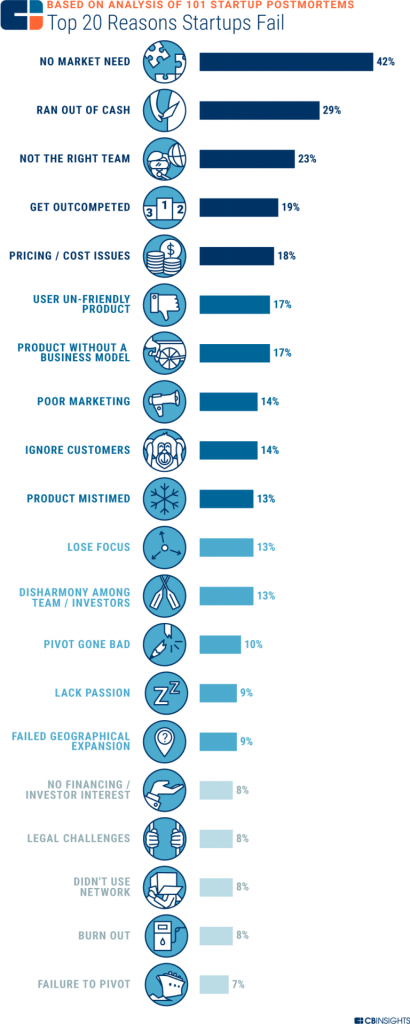Why Startups Fail: Lessons for Education Companies
Bad pricing. Hard-to-use products. Shortages of cash. And worst of all: Selling something nobody wants.
There are lots of reasons why startups fail. The market research firm CB Insights collected information from across several industries about the collapse of what no doubt once seemed like winning business ideas. It then analyzed the reasons that the startups fell short, and put together a list of the Top 20 Reasons Startups Fail.
CB Insights uses data analysis to probe market trends and business strategy. It approached the demise of startups, or as they put it, the “data on startup death,” through that lens.
The company collected 101 publicly available explanations for why various startups did not succeed — from media accounts, or in some cases from mea culpas or matter-of-fact statements written by company officials themselves. It then analyzed the reasons for the failures, and came up with a top-20 list.
While CB Insights couldn’t offer a firm count of how many of the companies it looked at work in the education arena, many of the reasons will certainly resonate in the hard-to-crack K-12 education space.
The number one reason the startups in question failed? There was “no market need,” for the product, CB Insights found. The second-biggest reason was that startups ran out of cash, followed by not having not the right team, getting out-competed by other products, having problems with pricing/cost, and having a “user-unfriendly product.”
Many of those problems doom K-12 companies, too. Entrepreneurs trying to work in schools come to the market with distinct ideas about what schools want–but few options for testing their hypotheses in schools, which are wary of introducing new, relatively unknown products. A number of commercial and nonprofit programs are trying to bridge that gap, by giving education vendors opportunities to work in schools, refine their ideas, and potentially win over customers.
Another challenge for education startups: Their product may be designed to help teachers and students, but they still have to win approval from district administrators who control the purse strings.
A group of teachers might rave about a product–yet administrators may be unwilling to buy it. Or, an administrator may turn out to be a product’s greatest champion–but he doesn’t have the pulse of teachers or students, who end up being cool to it.
Pivoting also proves to be the undoing of many startups, CB Insights found. Specifically, a “pivot gone bad,” and a “failure to pivot.” Pivoting is a necessity for many companies in the ed-tech space. But there are also risks in trying it too soon, or changing course without enough data to back up the decision, as investor and executive Rusty Greiff explained in an EdWeek Market Brief story earlier this year. (Our K-12 Startup Blog also explores many of these same themes.)
Check out CB Insights’ full list of the top reasons startups come up short, below:

Follow EdWeek Market Brief on Twitter @EdMarketBrief or connect with us on LinkedIn.
See also:
- The Startup Blog on EdWeek Market Brief
- Your Startup Idea is Genius: How to Get Customers to Recognize It
- Listen to Customer Feedback to Move Your Startup Ahead in 2018
- How Ed-Tech Startups Are Navigating the Data Privacy Maze
